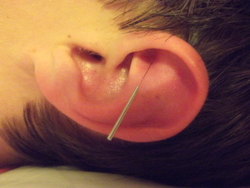 German researchers at the University Medical Center, Hamburg-Eppendorf, have found that acupuncture improves nerve regeneration in chemotherapy-induced peripheral neuropathy. The progress is measurable both in terms of subjective reporting by patients, and objective neurological findings.
German researchers at the University Medical Center, Hamburg-Eppendorf, have found that acupuncture improves nerve regeneration in chemotherapy-induced peripheral neuropathy. The progress is measurable both in terms of subjective reporting by patients, and objective neurological findings.
In a cross-over study, 60 patients were randomly assigned to either an acupuncture group, or to a waiting list control group. Ten acupuncture sessions were given once per week. The groups were then reversed, for a further ten weeks of treatment to be given this time to the former waiting list group.
After 28 weeks, evaluation of both groups showed that sensory nerve amplitude and conduction velocity were both improved after acupuncture, compared with the control group. Acupuncture patients also reported improvements in symptoms such as burning pain, cramps, numbness, symptom frequency and unsteadiness of gait. Physical examination revealed that acupuncture patients had significant improvements in blind walking, heel-to-toe walking, ability to perceive vibration and neuropathy deficit scores, compared with the waiting list group.
(Acupuncture improves chemotherapy-induced neuropathy explored by neurophysiological & clinical outcomes – The randomized, controlled, cross-over ACUCIN trial. Phytomedicine, September 2022.)

 American researchers investigating whether acupuncture helps chemotherapy-induced neuropathy, have conducted a three-arm randomised trial at Memorial Sloan Kettering Cancer Center, New York. A group of 75 cancer patients were recruited. All had completed chemotherapy at least three months prior, and were experiencing moderate to severe neuropathy in the form of numbness, tingling or pain. Patients were randomly assigned to either real acupuncture, sham acupuncture or usual care. Acupuncture was given in the form of ten sessions over eight weeks, and biweekly for the first fortnight.
American researchers investigating whether acupuncture helps chemotherapy-induced neuropathy, have conducted a three-arm randomised trial at Memorial Sloan Kettering Cancer Center, New York. A group of 75 cancer patients were recruited. All had completed chemotherapy at least three months prior, and were experiencing moderate to severe neuropathy in the form of numbness, tingling or pain. Patients were randomly assigned to either real acupuncture, sham acupuncture or usual care. Acupuncture was given in the form of ten sessions over eight weeks, and biweekly for the first fortnight. An American team, part funded by the US Government’s National Institutes of Health, has shown that acupuncture for chemotherapy-induced peripheral neuropathy, offers significant improvements over usual care. The pilot randomised trial recruited 75 patients who had received at least three months of chemotherapy. They compared eight weeks of acupuncture, with both sham acupuncture and usual care. Compared with usual care, real acupuncture had the greatest effect on pain, tingling and numbness.
An American team, part funded by the US Government’s National Institutes of Health, has shown that acupuncture for chemotherapy-induced peripheral neuropathy, offers significant improvements over usual care. The pilot randomised trial recruited 75 patients who had received at least three months of chemotherapy. They compared eight weeks of acupuncture, with both sham acupuncture and usual care. Compared with usual care, real acupuncture had the greatest effect on pain, tingling and numbness. 